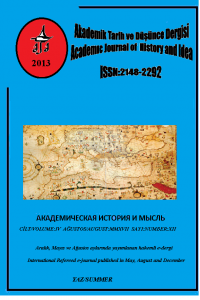Öz
Bu çalışmada, sofistlerin bilgi
anlayışının, epistemolojideki yerlerinin ne olduğu ele alınmaya çalışılmıştır.
Onların epistemolojideki yerleri belirlenirken, öncelikle hangi gerekçelerle
ortaya çıktıları, dönemlerinin siyasal kültürel koşulları göz önünde bulundurularak
bilginin imkânı ve sınırları, bilgiye ulaşmada kullanılacak kaynağın ne olduğu,
doğruluğun ölçütünün ne olacağı tartışılmıştır.
Çalışmadaki sorun, sofistlerin
bilginin kaynağını duyum bilgisine dayandırmaları sonucuyla fenomenalizmin ve
şüpheciliğin sıkı birer savunucuları olarak bilgide rölativizme neden olmalarıyla
ortaya çıkan problemlerdir. Bu problemler, sadece mutlak bilginin reddi değil
aynı zamanda evrensel oldukları kabul edilen değerler sisteminin de reddi olmaktadır.
Sofistler, evrensel, mutlak bilginin olamayacağını ve tümel bir ahlaki norm
olmayacağını eleştirel, şüphe eden bir zihniyetle savunmuşlardır. Onların
evrensel bir norm ya da bilgi olamayacağını savunmalarının temelinde yatan şey
ise onlardan evvel aristokratik Grek kültüründe kabul edilen ve kalıtsal olduğuna
inanılan physis ve nomos arasında, tercihlerini nomos/thesei’den yana yapmalarıdır.
Burada, konulmuş olan thesei’in savunulması zihinde doğuştan getirilen ideler
olmadığının kabulü anlamına gelmektedir. Sofistlerle birlikte karşımızda duran
bu ‘yeni insan’ kendi kaderini Tanrıların ellerine teslim etmeyen, varoluşunu
bizzat kendisi oluşturan ‘aydınlanmış insan’dır. Dolayısıyla, siyaset, din,
ahlak ve sanat insanların elindedir.
Bu anlamda, ‘yeni insan’ yaratımıyla
Sofistlerle birlikte felsefenin yönünün de değiştiğini anlıyoruz. Çünkü yeni
bir insan anlayışı, yeni bir varlık ve bilgi anlayışı demektir.
Kaynakça
- ARİSTOTELES, 2007, Sofistlerin Çürütmeleri, Üzerine, Say Yayın-ları, İstanbul.
- ARSLAN, Ahmet, 2010, İlkçağ Felsefe Tarihi II, Bilgi Üniversitesi Yayınları, İstanbul.
- CEVİZCİ, Ahmet, 2000, Felsefe Sözlüğü, Paradigma Yayınları, İstanbul.
- CEVİZCİ, Ahmet, 2012, İlkçağ Felsefesi Tarihi, Asa Kitabevi, Bursa.
- COPLESTON, Friedrick, 1993, A History Of Philosophy Volume I, Image Books, Doubleday.
- DAVİDSON, Thomas, 2008, Greklerde Eğitim Düşüncesi, Çe-viren: Ahmet Aydoğan, Say Ya-yınları, İstanbul.
- ERDEM, Hüsameddin, 1998, İlk-çağ Felsefesi Tarihi, Sebat Ofset Matbaacılık, Konya.
- GÖKBERK, Macit, 2001, Felsefe Tarihi, Remzi Kitabevi, İstanbul.
- GUTHRİE, W.K.C., 1999, İlkçağ Felsefesi Tarihi, Çeviren: Ahmet Cevizci, Gündoğan Yayınları.
- HORNBLOWER, Simon-Antony Spawforth, 1996, The Oxford Classical Dictionary, Third Edition, Oxford University Press. New York.
- JONES, W.T., 2006, Batı Felse-fesi Tarihi I, Çeviren: Hakkı Hünler, Paradigma Yayınları, Bursa.
- PLATON, 2009, Theaitetos, Çevi-ren: Macit Gökberk, Remzi Kitabevi, İstanbul.
- ŞENEL, Alaeddin, 1970, Eski Yunan’da Eşitlik Ve Eşitsizlik Üstüne, Ankara Üniversitesi Siya-sal Üstüne, Ankara, Ankara Üni-versitesi Siyasal Bilgiler Fakültesi Yayınları, Ankara.
- TARNAS, Richard, 2013, Batı Düşüncesi Tarihi I, Çeviren: Yu-suf Kaplan, Külliyat Yayınları, İstanbul.
- WEBER, Alfred, 1991, Felsefe Tarihi, Çeviren: H. Vehbi Eralp, İstanbul.
- ZELLER, Eduard, 2001, Grek Felsefesi Tarihi, Çeviren: Ahmet Hamdi Gündoğan, Say Yayınları, İstanbul.
Öz
. In this study it is attempted to deal with sophists’ mind of knowledge is in the epistemology. While their location in the epistemology is determined it is discussed firstly for what reasons and the political culturalConditions of possibility of knowledge, limits what is the source of information to use, what will be the measure of accuracy.Problem in study are issues emerging from relativism in the knowledge which cause to sophists as tight advocate of phenomenology and skepticism. This, it is result in that sophists base on the sensory of the source of knowledge. These problems are not only the rejection of absolute knowledge but also the rejection of the accepted system of universal values. The sophists defends on would not be universal, absolute knowledge and a universal moral norm with a mind that criticized, doubted. What lies at the heart of their defense of being a universal norm or information is that they prefer the nomos / these to physis and nomos, which are believed to be accepted and inherited in the aristocratic Greek culture before them Here, the defense of thesei as things implies the assumption that there are no inherited idea in the mind. This 'new man' standing with the sophists is an 'enlightened person' who does not surrender his own destiny to the hands of the gods. Therefore, politics, religion, morality and art are in the hands of people.
In this sense, we understand that the creation of 'new man' has changed the direction of philosophy with the sophists. Because a new understanding of person means a new understanding of being and information.
Kaynakça
- ARİSTOTELES, 2007, Sofistlerin Çürütmeleri, Üzerine, Say Yayın-ları, İstanbul.
- ARSLAN, Ahmet, 2010, İlkçağ Felsefe Tarihi II, Bilgi Üniversitesi Yayınları, İstanbul.
- CEVİZCİ, Ahmet, 2000, Felsefe Sözlüğü, Paradigma Yayınları, İstanbul.
- CEVİZCİ, Ahmet, 2012, İlkçağ Felsefesi Tarihi, Asa Kitabevi, Bursa.
- COPLESTON, Friedrick, 1993, A History Of Philosophy Volume I, Image Books, Doubleday.
- DAVİDSON, Thomas, 2008, Greklerde Eğitim Düşüncesi, Çe-viren: Ahmet Aydoğan, Say Ya-yınları, İstanbul.
- ERDEM, Hüsameddin, 1998, İlk-çağ Felsefesi Tarihi, Sebat Ofset Matbaacılık, Konya.
- GÖKBERK, Macit, 2001, Felsefe Tarihi, Remzi Kitabevi, İstanbul.
- GUTHRİE, W.K.C., 1999, İlkçağ Felsefesi Tarihi, Çeviren: Ahmet Cevizci, Gündoğan Yayınları.
- HORNBLOWER, Simon-Antony Spawforth, 1996, The Oxford Classical Dictionary, Third Edition, Oxford University Press. New York.
- JONES, W.T., 2006, Batı Felse-fesi Tarihi I, Çeviren: Hakkı Hünler, Paradigma Yayınları, Bursa.
- PLATON, 2009, Theaitetos, Çevi-ren: Macit Gökberk, Remzi Kitabevi, İstanbul.
- ŞENEL, Alaeddin, 1970, Eski Yunan’da Eşitlik Ve Eşitsizlik Üstüne, Ankara Üniversitesi Siya-sal Üstüne, Ankara, Ankara Üni-versitesi Siyasal Bilgiler Fakültesi Yayınları, Ankara.
- TARNAS, Richard, 2013, Batı Düşüncesi Tarihi I, Çeviren: Yu-suf Kaplan, Külliyat Yayınları, İstanbul.
- WEBER, Alfred, 1991, Felsefe Tarihi, Çeviren: H. Vehbi Eralp, İstanbul.
- ZELLER, Eduard, 2001, Grek Felsefesi Tarihi, Çeviren: Ahmet Hamdi Gündoğan, Say Yayınları, İstanbul.
Ayrıntılar
| Birincil Dil | Türkçe |
|---|---|
| Bölüm | Makaleler |
| Yazarlar | |
| Yayımlanma Tarihi | 25 Ağustos 2017 |
| Yayımlandığı Sayı | Yıl 2017 Cilt: 4 Sayı: 12 |

